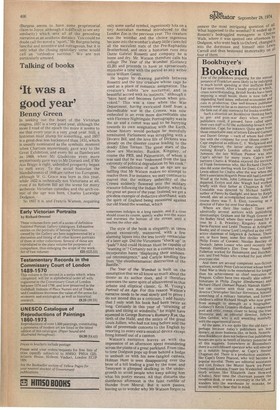Bookbuyer's
Bookend
Few of the publishers preparing for the annual penance of Frankfurt seem likely to be indulging in much lavish spending at that ineffable Book Fair next month. After a heady period in which, crises notwithstanding, British books have beer! enjoying a small boom, there is now talk ot impending hard times, enforced economies and cuts in production. One well-known publisher recently went so far as to instruct editors to ease the firm out of any contracts for books overdue. Such a situation set Bookbuyer thinking back to preand post-war days when several publishers could, if pressed, have called upon their own staff to fill the authorship breach with distinction. Cape, for instance. Quite apart from those remarkable men of letters Edward Garnett and Daniel George — each of whom had close ties with the company for over fifteen years — Cape employed as editors C. V. Wedgwood and Guy Chapman, the latter after experience running Knopf's London office with Storm Jameson; the late William Plomer was also Cape's adviser for many years. Cape's new partners Chatto & Windus enjoyed the services of Frank Swinnerton who, like Richard Church, also did some sterling work for Dent; Cecil Day Lewis edited for Chatto after the war when the firm's associates Hogarth Press still had Leonard Woolf at the helm, John Lehmann having just departed. Evelyn and Alec Waugh had worked briefly with their father at Chapman & Hall: Constable was directed by Michael Sadleir, author of Fanny by Gaslight, and later by Ralph Arnold, also an accomplished novelist. And of course there was T. S. Eliot, towering as a director of Faber for over four decades.
Where are their like today? There are admittedly several authors with publishing directorships: Graham and Sir Hugh Greene at the Bodley Head, where they were joined for a time by J. B. Priestley; Kingsley Amis at Davis-Poynter and Leslie Thomas at Arlington Books; and of course Lord Longford as the very active chairman of Sidgwick & Jackson. There are, or have been, some fine thriller writers: Philip Evans of Coronet; Nicolas Bentley of Deutsch; James Leasor who until recently ran Hamish Hamilton's Elm Tree Press; Sand)? Fullerton worked for Heinemann and Hutchinson; and Fred Nolan who worked for just about everyone else.
And there are several competent non-fiction authors, notably Peter C,alvocoressi whose book Total War is likely to be remembered for longer than his achievement as chief executive of Penguin. Collins have two equally able editor' historians in Philip Ziegler (Omdurman) and Richard 011ard (Samuel Pepys). Hamish Hamilton can counter with their own managing director Christopher Sinclair-Stevenson, himself something of a military historian, and former children's.editor Richard Hough who now goes from strength to strength as a biographer. Gollancz's Kevin Crossley-Holland, a respected poet and critic, comes closer to being the true litterateur and, as editorial director, follows Giles Gordon, who is still wrestling manfully with the experimental novel.
All the same, it's not quite like the old days — perhaps because today's publishers are less literary, or more business-like, or both. Nonetheless Bookbuyer does not believe that publishing houses are quite so bereft of literary potential as all this suggests. Somewhere in Bloomsbury there is a switchboard operator who will emerge as a notable biographer, as Cape's Hester Chapman did. There is a production assistant, like Cape's Diane Pearson, who will become a popular novelist. There are editorial assistants and Girl Fridays like Muriel Spark (ex-Peter Owen) and Antonia Fraser (ex-Weidenfeld) and blurb writers, like Elizabeth Jane Howard (Chatto). Next time the chairman passes the reception desk, or sees a secretary in the lift, or wanders into the warehouse by mistake, he would do well to bear that in mind.


































 Previous page
Previous page